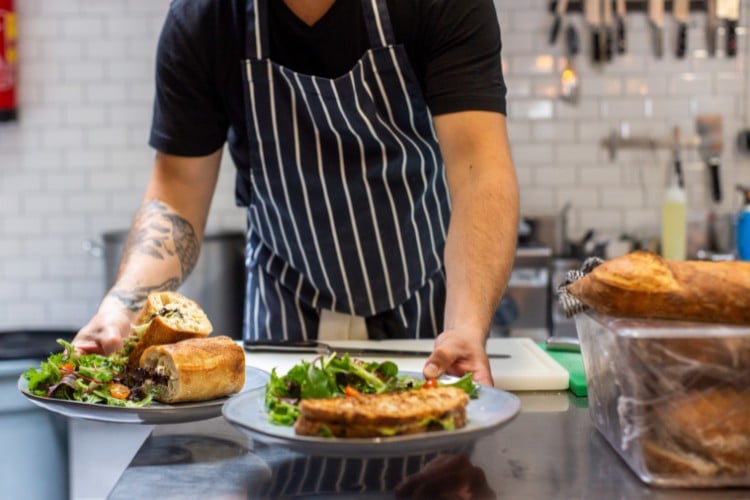The scenario: you’re taking someone’s order, closing someone else’s check, being called to clean up a spill, and asked to run a round of dishes through the dishwasher. What do you do?
Foodservice workers are constantly and simultaneously juggling multiple requests from teammates AND customers. Food handlers have to be ready to assist at every level and the only way to succeed is to be a master at multitasking. Read on for some tips and tricks for improving some of the multitasking musts that can help food handlers stay ahead of the game. These include:
Time management
The food industry moves fast and it certainly stops for no one. Whether you’re in the middle of the dinner rush or opening the kitchen for the day, time management is essential. You can improve your time management by making sure your workspaces are well organized, creating an internal routine for yourself during shifts, setting time limits on tasks, and avoiding distractions like phone use or getting caught up talking to a friend that came in.
Group tasks together
A time management trick that deserves its own shoutout is grouping tasks together or habit-stacking within the routine you built for yourself within your shift.1 Need to prep some extra veggies and overhear expo say they need more garnish cut? Grab an extra cutting board and storage container and BOOM! Two tasks checked off the list. Cleaning the bathroom at the end of the day? Bring re-stocks of toilet paper, paper towels, and soap with you to reduce running back and forth. Combining tasks within specific time or location blocks is an effective way to cut down on the overall time each individual task takes.
Prioritization
Advice about prioritizing tasks often, hilariously, suggests only doing one task at a time. If you’ve ever spent even an hour in a kitchen, you may think that advice can’t possibly be applied in the food industry. You know what though? You have to! Unless you can suddenly be in two places at once, you’re already making priority choices on the fly.
The best thing you can do to improve your prioritization is to start by asking some questions to determine what is most urgent. What needs to be done now? What can be delayed a few minutes? Can I delegate a task to someone else? Is there a task that can be dropped until the end of the shift? Always remember communication is key, so if you’re delaying, delegating, or dropping a task you must let other people know when or how their requests will be handled down the line.
Communication
Speaking of communication…Kitchens that run like well-oiled machines all have one thing in common: exceptional communication skills.2 Whether it is a team meeting at the start of a shift, regularly updated signage about cleaning policies, or knowing the right way to politely ask the back-of-house the status of a dish, communicating early and often can save the day.
If you’re feeling overwhelmed or you’re already in the middle of a task when a new request comes in, make sure you let the manager on duty know you need a minute or that you need an extra hand. Your managers and teammates won’t know you need help unless you ask, so make sure you advocate for yourself and ask!
Industry veterans can also help new hires by sharing the tips and tricks of the kitchen along the way. Knowledge sharing can improve everyone’s ability to perform under pressure and increase everyone’s ability to work together as a cohesive team.
Memorization
New recipes, food allergy warnings, updated menus, customer orders, special pricing, safe food handling practices, and operations procedures are just a few of the details foodservice workers constantly have to learn and relearn. The best ways to improve your memorization skills include: reading information out loud, visualizing what you need to remember, breaking the information up into smaller bites, and avoiding cramming at the last minute. If you’re new to the food industry, or even the business you’re working for, you can ask your manager if they have any training materials or an extra copy of the menu so you can create flashcards or a cheat sheet to help you pick up the details.
Work at a steady pace
It is incredibly difficult to not get caught up in the chaos of a rush, but the saying “slow and steady wins the race” didn’t come out of thin air! Now we’re not saying to move around the kitchen like a turtle, but ensuring that a task is done correctly the first time is far more important than rushing through and having to call a re-do.3 Learning how to steadily work at an efficient pace by using some of the other strategies we’ve covered today can make for higher quality work across the board.
These multitasking musts are skills that can help everyone on the team provide exceptional customer service while keeping food safe. If you talk to food industry veterans, many will tell you that they love the fast-paced nature of the work and how it keeps them on their toes. What they don’t tell you is that they’ve mastered these multitasking skills without even really thinking about it!
Do you have other multitasking skills in your pocket that other food industry workers can benefit from? We want to know! Send us an email at info@trust20.co or message us on Instagram today!
Sources:





.png)

.png)
